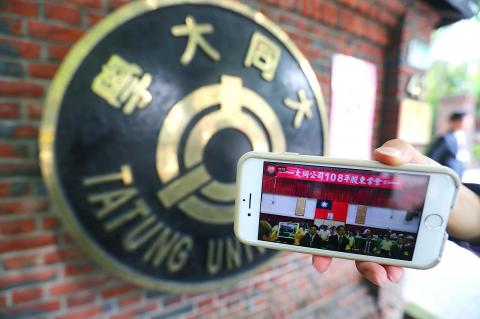Tatung Co (大同) shareholders, including top executives, yesterday voted down three proposals by minority shareholders to remove three independent directors, thwarting plans to dissolve an audit committee and elect a new board of directors.
Some shareholders had said retaining the current board could make it difficult for the company to revamp its business, as a string of scandals, corporate losses and delisting of some subsidiaries drew criticism from not only shareholders, but also financial regulators.
“Tatung has not distributed a cash dividend in 18 years. The board of directors should step down and be responsible for the company’s net losses of NT$33.29 billion [US$1.06 billion] for last year, as three of its subsidiaries were delisted, in addition to embezzlement by former chairman Lin Wei-shan (林蔚山),” Vivian Tsai (蔡玉真), a Tatung shareholder and a media personality, told reporters after the company’s annual general meeting in Taipei.

Photo: CNA
The company said removing the directors would harm its corporate image and that it is improper to blame them for the company’s losses.
Reporters were not allowed into the meeting, which was live-streamed on social media.
The delisting of Tatung’s three subsidiaries was a painful process, but the company is restructuring its business and aims to make improvements, it said.
Minority shareholders led by Shanyuan Group (三圓建設) chairman Wang Kuang-hsiang (王光祥) — who proposed removing independent directors Wu Chi-ming (吳啟銘), Liu Tsung-te (劉宗德) and Su Peng-fei (蘇鵬飛) — own about 20 percent of the shares, while chairwoman Lin Kuo Wen-yen (林郭文艷) and her allies hold about 10 percent, the Chinese-language Liberty Times (the sister newspaper of the Taipei Times) reported.
At one point in the meeting, tensions broke out when chairwoman Lin Kuo Wen-yen announced the voting time for each proposal would be two minutes but some shareholders requested the voting time to be five minutes. It then resulted in clashes between some shareholders and the company's security guards before Lin Kuo agreeing to three minutes for the voting time.
The three proposals were approved by 48.5 percent of shareholders in attendance on average, just shy of the 50 percent threshold, while 23.7 percent disapproved and 27.8 percent waived their votes.
The meeting was attended by 95.4 percent of shareholders.
Some shareholders asked for a recount and threatened to take legal action against the management, Tsai said.
Other proposals, such as revising the procedures for acquisition and disposal of assets as well as those for guarantees and lending, were also rejected, Tsai said.
Shareholders only approved the company’s financial statement and a plan to write down last year’s losses with a 53.48 percent majority, she said.
Lin Kuo Wen-yen said she regretted that the revision proposal, which was put forward under instructions from the Financial Supervisory Commission, did not win shareholders’ approval.
The company would appoint external experts to conduct an independent investigation over the qualifications of the three directors, she said.
Late last night, Tatung said in a statement that it would lodge legal actions against those who deliberately broke company equipment and clashed with company employees and security guards during the meeting.
Revenue last month fell 51.39 percent annually to NT$2.62 billion, with cumulative revenue for the first five months retreating 50.13 percent to NT$13.56 billion, from NT$27.2 billion a year earlier.
Tatung shares yesterday closed down 1.2 percent at NT$20.55 in Taipei.

Among the rows of vibrators, rubber torsos and leather harnesses at a Chinese sex toys exhibition in Shanghai this weekend, the beginnings of an artificial intelligence (AI)-driven shift in the industry quietly pulsed. China manufactures about 70 percent of the world’s sex toys, most of it the “hardware” on display at the fair — whether that be technicolor tentacled dildos or hyper-realistic personalized silicone dolls. Yet smart toys have been rising in popularity for some time. Many major European and US brands already offer tech-enhanced products that can enable long-distance love, monitor well-being and even bring people one step closer to

Malaysia’s leader yesterday announced plans to build a massive semiconductor design park, aiming to boost the Southeast Asian nation’s role in the global chip industry. A prominent player in the semiconductor industry for decades, Malaysia accounts for an estimated 13 percent of global back-end manufacturing, according to German tech giant Bosch. Now it wants to go beyond production and emerge as a chip design powerhouse too, Malaysian Prime Minister Anwar Ibrahim said. “I am pleased to announce the largest IC (integrated circuit) Design Park in Southeast Asia, that will house world-class anchor tenants and collaborate with global companies such as Arm [Holdings PLC],”

Thousands of parents in Singapore are furious after a Cordlife Group Ltd (康盛人生集團), a major operator of cord blood banks in Asia, irreparably damaged their children’s samples through improper handling, with some now pursuing legal action. The ongoing case, one of the worst to hit the largely untested industry, has renewed concerns over companies marketing themselves to anxious parents with mostly unproven assurances. This has implications across the region, given Cordlife’s operations in Hong Kong, Macau, Indonesia, the Philippines and India. The parents paid for years to have their infants’ cord blood stored, with the understanding that the stem cells they contained

Sales in the retail, and food and beverage sectors last month continued to rise, increasing 0.7 percent and 13.6 percent respectively from a year earlier, setting record highs for the month of March, the Ministry of Economic Affairs said yesterday. Sales in the wholesale sector also grew last month by 4.6 annually, mainly due to the business opportunities for emerging applications related to artificial intelligence (AI) and high-performance computing technologies, the ministry said in a report. The ministry forecast that retail, and food and beverage sales this month would retain their growth momentum as the former would benefit from Tomb Sweeping Day